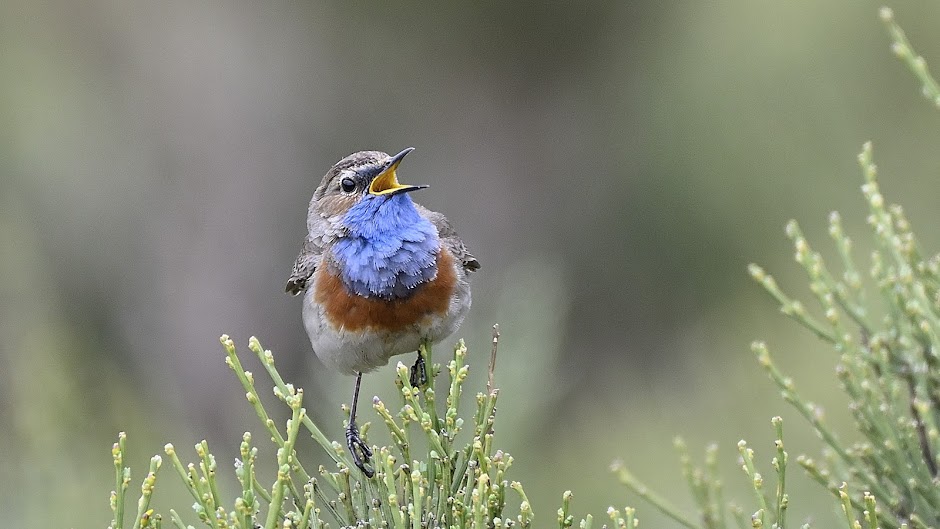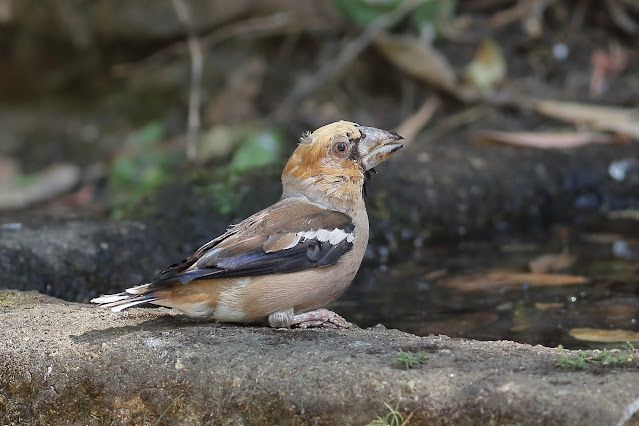Hola una vez más.
Hi again.
Hi again.
En el siguiente enlace podéis ver nuestros próximos viajes fotográficos y de observación de aves y mamíferos nacionales y al extranjero. Espero que os gusten y os animéis a venir conmigo. Una experiencia que nunca olvidareis.
In the following link you can see our next national and foreign Birds and Mammals photographic and observation trips. I hope you like them and I encourage you to come with me. An experience that you will not forget.
En esta vez os enseño lo que pude fotografiar en dos excursiones privadas para fotografiar buitres y otras aves a finales del mes de julio. Los clientes querían fotografiar aves y decidí llevarles hasta Monfragüe a ver que podíamos hacer. Uno de los principales objetivos de los viajes era poder fotografiar a los buitres leonados (Gyps
fulvus) y alimoches comunes (Neophron
percnopterus) a nuestra altura y no tanto volando por encima de nosotros. Hubo suerte y en ambos días conseguimos buenas fotos.
This time I show you what I was able to photograph on two private trips to photograph Vultures and other Birds at the end of July. The clients wanted to photograph Birds and I decided to take them to Monfragüe to see what we could do. One of the main objectives of the trips was to be able to photograph Griffon Vulture and Egyptian Vulture at our height and not so much flying above us. We were lucky and on both days we got good photos.
Lo peor de todo fue el calor que había pues llegamos, en uno de los días, a soportar temperaturas de 40ºC. En ambos días salimos temprano de Madrid para poder llegar hasta allí con las temperaturas soportables pues para fotografiar los buitres había que estar a pleno sol.
The worst of all was the heat that had there because we arrived, on one of the days, to withstand temperatures of 40ºC. On both days we left Madrid early to be able to get there with bearable temperatures, since to photograph Vultures you had to be in full sun.
The worst of all was the heat that had there because we arrived, on one of the days, to withstand temperatures of 40ºC. On both days we left Madrid early to be able to get there with bearable temperatures, since to photograph Vultures you had to be in full sun.
Estas son algunas de las fotos que tomé en ambos días de buitre leonado (Gyps
fulvus).
These are some of the photos I took on both days of Griffon Vultures.
Y estas las de alimoche común (Neophron
percnopterus). En esta foto un subadulto. Fijaos que aun no tiene la piel de la cara amarilla.
And these are of the Egyptian Vulture. In this photo a subadult. Note that he still does not have yellow face skin.
Las siguientes fotos fueron de adultos.
The following photos were of adults.
Como estaba previsto, vimos muy pocos buitres negros (Aegypius monachus). Este fue el único que fotografíe. Los demás, muy pocos, pasaron demasiado altos para las fotos que yo quería obtener.
As expected, we saw very few Black Vultures . This was the only one I photographed. The rest, very few, passed too high for the photos I wanted to get.
En uno de los merenderos estaba instalada esta cierva (Cervus elaphus).
This hind was in one of the picnic areas.
Un video hecho con mi teléfono móvil.
A video made with my cell phone.
Por la tarde nos instalamos en una fuente de agua a ver que podíamos fotografiar pues se estaba a la sombra y no se podía hacer nada mejor. En ambos días pasamos un rato muy bueno fotografiando las especies que a ella acudían. En total vimos muy cerca 26 especies. Lo peor de todo era que la mayoría de las aves, por no decir todas, tenían un plumaje muy desgastado y estaban en pleno proceso de mudar sus plumas. Una pena. En la foto un trepador azul (Sitta europaea).
In the afternoon we settled in a water source to see what we could photograph because it was in a shaded place and there was nothing better to do. On both days we had a very good time photographing the species that came to it. In total we saw 26 species very close. Worst of all, most, if not all, Birds had very worn plumage and were in the process of molting. A pity In the photo a European
Nuthatch.
Curruca capirotada (Puffinus
gravis) macho.
Male Blackcap.
Hembra.
Female.
Había muchos mirlos comunes (Turdus
merula) pero no les presté mucha atención al haberlos por muchos sitios. En la foto un macho.
There were many Blackbirds but I didn't pay much attention to them as there are in so many places. In the photo a male.
Hembra.
Female.
También acudían muchos carboneros comunes (Parus
major).
Many Great Tits also came.
Un joven.
A juvenile.
Curruca cabecinegra (Sylvia
melanocephala).
Sardinian
Warbler.
Mito (Aegithalus
caudatus).
Long-tailed
Tit.
Macho de pinzón vulgar (Fringilla
coelebs).
Common
Chaffinch male.
Hembra/juvenil.
Female/juvenil.
Arrendajo euroasiático (Garrulus glandarius).
Eurasian
Jay.
Son muy bonitos.
They are very pretty.
Chochín paleártico (Troglodytes
troglodytes).
Eurasian Wren.
Los miméticos agateador europeo (Certhia brachydactyla).
The mimetic Short-toed
Treecreeper.
Una rana común (Pelophylax perezi) salió a tomar el sol. Menudo aguante que tenía con el calor que hacía.
A Iberian Water Frog came out to sunbathe. What a stamina it had with the heat it was.
Me hizo mucha ilusión que vinieran muchos picogordos (Coccothraustes
coccothraustes) a pesar de estar tan feos de plumaje. En la foto un macho.
I was very excited that many Hawfinch came despite their ugly plumage. In the photo a male.
Hembras.
Females.
Juveniles.
Juveniles.
Curruca carrasqueña (Sylvia
cantillans) macho.
Subalpine
Warbler male.
Joven.
Juvenile.
Petirrojo europeo (Erithacus
rubecula).
European Robin.
Juveniles.
Juveniles.
Los más abundantes eran los herrerillos comunes (Cyanistes
caeruleus).
The most abundant were Blue Tits.
Uno de ellos sufría una aberración cromática conocida como esquizocroismo que es muy rara.
One of them suffered from a chromatic aberration known as schizochroism which is very rare.
De todos modos, me pareció muy bonito este ejemplar.
In any case, I found this specimen very beautiful.
También apareció esta lagartija colilarga (Psammodromus algirus).
It also appear this Large Psammodromus.
Herrerillo capuchino (Lophophanes
cristatus).
Crested Tit.
Papamoscas gris (Muscicapa
striata).
Spotted Flycatcher.
Y por último este escribano soteño (Emberiza
cirlus).
And last this Cirl
Bunting.
Algunas otras fotos y videos que saqué en distintos puntos del Parque. En la foto un abejaruco europeo (Merops
apiaster).
Some other photosand viseos I took in different places in the Park. In the photo a European Bee-eater.
Garza real (Ardea
cinerea).
Grey
Heron.
Una libélula flecha roja (Sympetrum sanguineum).
A Ruddy Darter.
Alimoche común (Neophron
percnopterus) en su nido.
Egyptian Vulture in its nest.
Una impresionante mariposa que no había visto nunca. Cuatro colas (Charaxes jassius).
An awesome butterfly that I had never seen before.Two-tailed Pasha.
Un adulto de cigüeña negra (Ciconia
nigra).
An adult Black Stork.
En los tres nidos de cigüeñas negras que se pueden ver desde el Observatorio del Salto del Gitano, estos tres pollos eran los más retrasados. Las otras dos parejas también habían sacado adelante otros 3 pollos cada una, pero ya estaban volando por los alrededores.
In the three nests of black storks that can be seen from the Salto del Gitano Observatory, these three chicks were the most delayed. The other two couples had also raised another 3 chickens each but they were already flying around.
El segundo nido.
The second nest.
Y el tercero. Los jóvenes ya volaban e iban algunas veces a su nido.
And the third. Juveniles were already flying and sometimes went to their nest.
Y para finalizar os he puesto algunas fotos de este Parque tan bonito y lleno de aves.
And to finish I have put some photos of this beautiful Park full of Birds.
Si queréis suscribiros a este blog de los viajes que hacemos pincha en el siguiente enlace: Suscribirse y haz clic en ¿ Quieres suscribirte a nuestro blog?
If you want to subscribe to this post about the trips we do, click on the following link: Susbcribe and click on: Do you want to subscribe to our blog?
Espero que os haya gustado y hasta pronto.
I hope you like it and see you soon.










































































































No hay comentarios:
Publicar un comentario